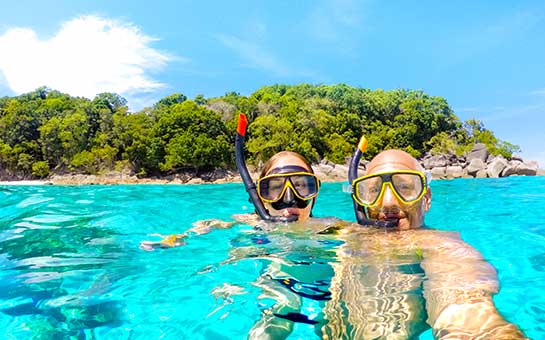Do you want to explore the underwater world? If you wish to dive in the ocean but don't want the hassle and expenses of scuba, then snorkeling is the perfect fit for you.
Snorkeling is one of the most popular water adventure sports. Both beginners and experts travel to beautiful locations to snorkel and catch a glimpse of the serene underwater world. Once you get a taste, you'll want to keep returning to it.
It does, however, come with its share of risks, just like any other extreme sport. Secure yourself with hazardous sports travel insurance for snorkeling as a financial safety net in case something goes wrong.
Travel Insurance for Snorkeling
There are some beautiful snorkeling spots around the world with crystal clear water and gorgeous coral structures. But sadly, most of these countries charge high prices for the types of injuries that can result from participating in adventure sports. With adventure sports travel insurance, however, you won't have to worry about medical bills disrupting your vacation.
A standard travel insurance plan does not always cover the elevated risk of hazardous sports. So, buy a hazardous sports travel insurance plan before you go snorkeling, and give yourself peace of mind.
Introduction to Snorkeling
The first evidence of snorkeling dates back to 3000 B.C. In ancient Crete, divers used hollow reeds to breathe while collecting sponges underwater. The first modern snorkel was designed by the artist and inventor Leonardo da Vinci around 1400 A.D. The fins were added much later in 1912 by a Frenchman.
Snorkeling is an inexpensive alternative to scuba diving that doesn't require extensive gear or training. But, you should only snorkel with an instructor or experienced divers. If you panic while in the water, the risks of injury or drowning increase drastically.
Before you go snorkeling, you should scout your spot. Ask local fishermen about the tides and currents in that vicinity. The sea is unpredictable and all-powerful. A lot of snorkeling accidents happen because the divers misjudged the currents and weather conditions. So pick a calm day for it.
While you can go snorkeling with just a snorkel, it's much safer if you gear up properly. A wetsuit and face mask will protect your skin, and fins will give you a tremendous boost in speed and power. Double-check your gear so that you are not caught unaware.
When you go snorkeling, remember that you are entering an exotic ecosystem. Observing marine animals in their natural habitat is a rare treat. It is important to remember to not touch them under any circumstance. Some of them, like jellyfishes, anemones, and sea urchins, are toxic and can make you sick.
Risks of Snorkeling
Snorkeling is fun, but the risks associated with it are real.
The most common injuries are muscle cramps. Sounds silly, right? But when you are underwater, cramps can be fatal. This usually happens more often with beginners who are unaccustomed to swimming for long stretches. The easiest solution is to always dive with an experienced partner who can pull you out of the water in such a situation.
Coral cuts and bruises are also common. Some coral is poisonous, and any wounds should be promptly treated. Jellyfish stings can also be painful, so keep your distance from them. Sea urchin stings are severe injuries, and the best option is to immediately go to a hospital for medical treatment.
Snorkeling is a hazardous sport and is inherently risky. But you can mitigate the financial impact of any injuries with an extreme sports travel insurance plan.
